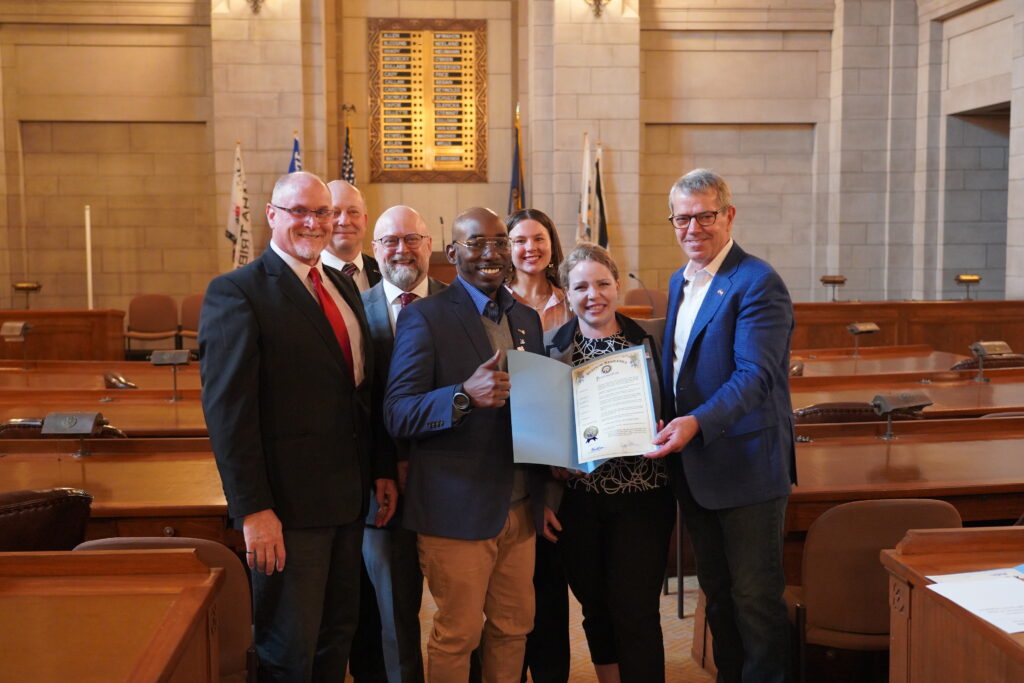Applications are open for Nebraska’s Innovation Fund Prototype Grant, a state-backed program that provides up to $150,000 in matching funds to help early-stage businesses build and test new products. However, this year, the number of available grants may be smaller, and funding may run out sooner, as state lawmakers have upheld a $3.7 million cut to the Business Innovation Act.
The Prototype Grant is part of the Nebraska Department of Economic Development’s broader effort to grow the state’s innovation economy by providing technical and financial assistance to startups. The program reimburses up to 66% of eligible costs for product development and has been a critical tool for startups trying to get to market without taking on debt or giving up equity.
But due to budget reductions approved this spring, the Business Innovation Act — which funds the Prototype Grant and several other entrepreneurship-focused programs — dropped from $14.7 million to just over $11 million for the current fiscal year.
Dan Hoffman, CEO of Invest Nebraska, which administers the funds and supports many of the grantees, said the cut was not as steep as originally proposed but was still significant.
“It was originally funded at $14.7 million, and the governor had proposed cutting $5 million out of that … so they only cut the program $3.7 million now,” Hoffman said. “Starting July 1 with the state’s new fiscal year, the program is funded at $11.7 million.”
Hoffman said he expects $4 million or less will be available for the Prototype Grant this year, compared to $4 million in the previous year.
“With reduced funding, we’re going to probably start to see the programs being shut down earlier, just because they’re going to run out of money,” said Hoffman. “They look at each one individually, but they kind of have a maximum that they try to give out just because, you know, they know there’s a limited amount of dollars.”
Grants are awarded on a rolling basis until funds are exhausted, and in past years, the program has closed halfway through the fiscal year because of high demand.
“You don’t want to see programs like the Business Innovation Act get reduced funding because we have this momentum going,” Hoffman said. “It takes a long period of time for companies to get started and get momentum and go out and raise (capital) … you have to have a long-term vision.”
A founder’s perspective: DreamMoney
Megan Hale, founder of DreamMoney, said receiving the Prototype Grant was a turning point. DreamMoney is a strategic financial planning platform that helps solo and small-team entrepreneurs, especially women, map sustainable revenue plans, develop financial skills and gain insight into their money mindset.
Hale applied for the Prototype Grant in September 2024 and received $75,000 the following month.
“I first heard about the grant from Erica Wassinger from Proven Ventures as I was exploring possible paths to funding,” Hale said. “I also knew $150K would be life-changing money for getting a minimum viable product developed that can start earning revenue.”
With the first round of funding, DreamMoney developed one of its most powerful financial tools: a calculator that provides users with immediate clarity on their income goals, pricing and revenue models. The grant allowed Hale to focus her revenue on hiring and marketing, while using the state funds for software development.
“Without the grant, this would no doubt delay our timeline to get to market, put far more financial pressure on the business to either self-fund or take on outside capital,” Hale said. “This grant is one of the few options that exist for founders to get access to the funding they need to become self-sustaining.”
DreamMoney’s mission focuses specifically on supporting women entrepreneurs. Though women own more than 40% of small businesses, only 7% generate over $250,000 per year. Hale said that closing this revenue gap could add $1.7 trillion to the U.S. economy.
“To get there, we have to help women make more money and close the financial confidence gap,” she said. “We take a holistic approach by incorporating financial psychology. We help women be more strategic about their growth.”
Now preparing to reapply for another round of Prototype Grant funding, Hale said the state’s support has meant more than just financial assistance.
“The innovation grant will always be one of the most important and meaningful parts of my journey as an early founder,” she said. “I owe so much of where I am today to winning the grant and the fire it lit under me to make the absolute most of those dollars.”
Reduced funds and rising demand
This year’s $3.7 million cut to the Business Innovation Act comes after Gov. Jim Pillen vetoed the Legislature’s attempt to maintain higher funding levels. In his veto explanation, the governor described the program as “duplicative” of other efforts by the Department of Economic Development.

The Legislature did not override the veto, and the department has not yet released its updated action plan outlining how reduced funds will be distributed across subprograms, which also include value-added agriculture, university research and commercialization support.
“There might be reduced funding for all of the programs under the Business Innovation Act,” Hoffman said. “I know the Department of Economic Development will put out an action plan addressing the funding levels for each of the programs.”
The Prototype Grant has historically been one of the most heavily used arms of the act, with dozens of early-stage businesses relying on it each year. Hoffman said the stakes are high.
“Obviously, there should be a very high priority on new businesses being started in the state,” he said. “Those are going to be the future businesses for growth opportunities.”
A fragile window of support
Hale said she was “saddened” to hear about the reduced funds.
“The startup ecosystem in Nebraska is a true gem of the Midwest,” she said. “Although I know this community is resilient and resourceful beyond measure, I worry about the gaping hole reduced funds will create for early-stage founders.”
While other grant opportunities exist, she said, few are as impactful or efficient for founders.
“Applying for grants is very time consuming for often much less money,” she said. “That’s why this grant isn’t just life-shifting for getting a dream off the ground, it’s truly a uniquely founder-focused initiative that lessens any founder’s load.”
What applicants need to know
The Prototype Grant program is competitive and available to Nebraska-based businesses with fewer than 500 employees. Applications are accepted until June 30, 2026, or until funds are depleted.
To qualify, applicants must provide matching funds equal to 50% of the requested amount, or 20% for projects in value-added agriculture or designated economic redevelopment areas. Grant funds are reimbursed after expenses are incurred and verified.
Applicants must submit a completed application form via the Nebraska Amplifund portal, a full business plan, evidence of secured matching funds and a budget outlining project costs directly related to product development.
Eligible expenses include contractor or employee wages, prototype materials and limited tooling or equipment. Indirect or unrelated business costs are not reimbursable. Approved projects must be completed and all funds drawn down within 24 months.
The Department of Economic Development encourages applicants to reach out for assistance before applying to ensure a strong submission.
Find more information about the program and application process here.



